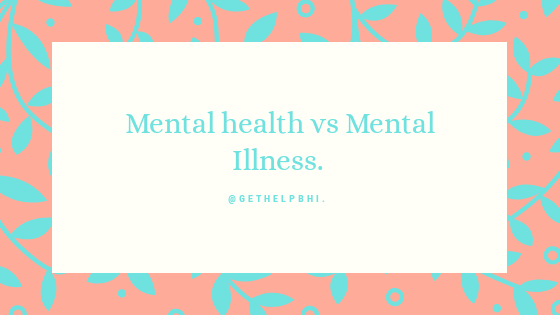Mental health and mental illness are generally used interchangeably to mean the same thing but these terms have different meanings. Just like everyone has physical health, everyone has mental health. Therefore, mental health is a broad term that describes an individual’s mental well-being, including how (s)he feels, thinks, behaves, and generally responds to life’s challenges.
There are varying degrees of physical health. We all have days where we feel a bit down, sad, confused, disappointed, or overwhelmed by something happening in our lives. An important part of good mental health is the ability to cope with problems and still remain productive in our daily routines. This implies that when we have good mental health, we do not allow stress or problems we face to get in the way of our normal routine. Good mental health isn’t about feeling happy and confident 100% of time and ignoring any problems. It’s about living and coping well despite problems.
Mental illness on the other hand, refers to a disorder that affects an individual’s mental wellbeing. These disorders usually occur as a result of physical health conditions, genetic mutations and environmental factors.
Like many physical illnesses, mental illnesses are thought to arise from the interaction of genetic vulnerability and stresses in life Mental illness cannot be solved by mere will power. Just like physical illness, they require medication and therapies. More often than not, the first step to getting help or treatment for mental illness is to first realize that there is a problem and that professional help should be sought.
Just like one may feel unwell and not have a serious illness such as a heart disease or diabetes for example, it is possible to have poor mental health without a mental illness. This is because mental illness falls within the extreme degrees of poor mental health and is further induced by stress and/or traumatic experiences. The opposite also holds true, it’s entirely possible to have good mental health even with a diagnosis of a mental illness. This is because mental illnesses are often episodic, meaning there are times (‘episodes’) of ill health and times of better or good health. However, mental health conditions are treatable and improvement is possible. Many people with mental health conditions return to full functioning.
Good mental health is as important as good physical health. It’s no surprise then that they are both influenced by a healthy lifestyle – ensuring we get enough sleep and eat healthily; trying to keep stress to a reasonable level, and relaxing regularly, especially through physical exercise; keeping alcohol consumption to recommended safe limits, and – very importantly – staying in touch with family and friends. Regardless of how our mental wellbeing is, it is important that we break the stigma associated with talking about mental illness. With the right support and treatment, we can ensure persons with mental illness live productive lives and that no one dealing with any form of illness should ever feel alone or ashamed to speak up and get help.


No responses yet